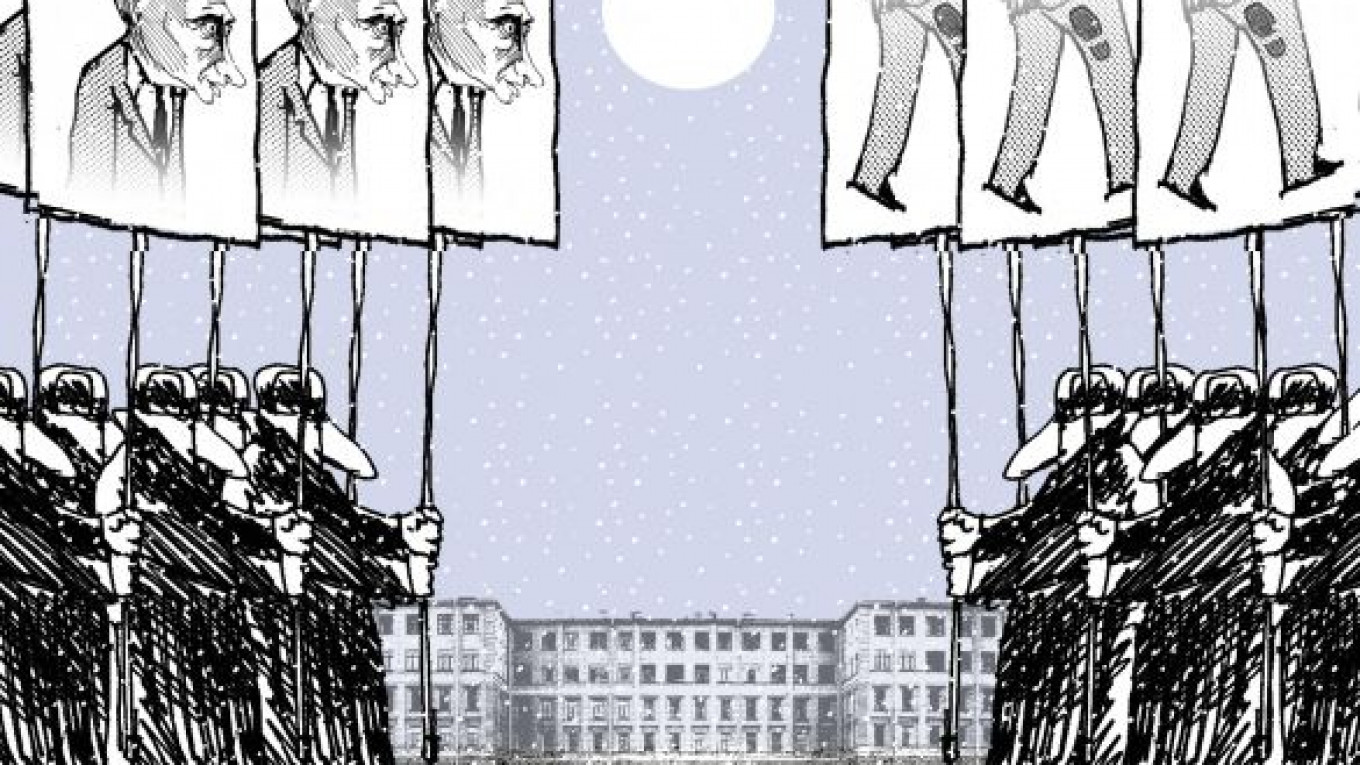On Saturday, we saw a new wave of protest rallies. Tens of thousands of people took to the streets despite the bitter cold. Braving temperatures of minus 19 degree Celsius, as many as 200,000 people turned out in Moscow alone. At Bolotnaya Ploshchad, protesters called for political liberalization and for Prime Minister Vladimir Putin to resign, while others at Poklonnaya Gora demonstrated their support for the country's leadership.
Besides Moscow, demonstrations were staged in Russia's regions. The reasons for the protests were varied. In Perm, the people were upset with the governor and his policies. In Krasnoyarsk, people protested against the increase in pollution from toxic plants in the region. In other cities, protesters focused on the increase in utility fees. These complaints are nothing new, but they have increased in intensity after the State Duma elections. Those elections triggered the release of pent-up anger over the corruption and the authorities' open disdain for the people.
The largest rallies outside of Moscow have been held in St. Petersburg and other cities with a million or more residents. In many of those cities, such as Novosibirsk, Yekaterinburg and Omsk, United Russia placed second to the Communist Party or A Just Russia, and in St. Petersburg it fared exceedingly badly.
Now that Yabloko leader Grigory Yavlinsky has been denied the right to register as a candidate, the presidential election has been shorn of any trace of legitimacy. Putin's rivals are nothing more than hand-picked sparring partners with no chance of being elected president. All of them except Mikhail Prokhorov are experienced hands who have repeatedly proven their loyalty to Putin in past elections. As for Prokhorov, he only asks that his multibillion-dollar fortune be safeguarded in return for toeing the Kremlin line.
Why did Putin prefer Prokhorov over Yavlinsky? Many in the West consider Prokhorov to be an independent candidate because of his enormous wealth. But actually the opposite is true. The larger a Russian's wealth, the more he depends on the Kremlin to preserve that wealth.
In addition, Yavlinsky would probably have been less manageable as a presidential candidate than Prokhorov. Moreover, Yavlinsky could have attracted more protest votes than Prokhorov — from 5 percent or 7 percent ?€” making it that much more difficult for Putin to win in the first round of voting.
Putin can't afford a second round. He needs to demonstrate to the political elite and the people that he is still the uncontested national leader and can win in the first round. Faced with the choice of having to falsify a certain percentage of the vote to win in the first round or face a second round, Putin would probably pick falsification as the "lesser of two evils."
Meanwhile, many analysts claim that the Kremlin has no plans to commit electoral fraud for the simple reason that Putin ?€” with popularity ratings that exceed 50 percent, according to some polls ?€” doesn't need to falsify results to win the first round.
But this argument doesn't hold water. In a system in which a governor's effectiveness is measured by his ability to secure votes for United Russia and Putin, electoral fraud is inevitable, even if the leader publicly calls for honest elections. The governors understand that their jobs depend on their ability to produce good results for Putin. So their main goal is to protect their own skins. This means that they will manipulate the vote when necessary to secure a victory for Putin in the regions ?€” and, most important, not be caught at it. The big lesson from the Duma elections is to improve the "technology" of electoral fraud and not leave a trail for election monitors.
It has been said the internal bickering among protest leaders will discredit the movement and give victory to the authorities and that the protests will fade away without producing any positive results.
But this is unlikely for two reasons. First, the protest movement has grassroots appeal, and it is extremely unlikely that any of its leaders would discredit themselves by selling out to the authorities.
Second, the protests have already stripped the authorities of their thin veneer of legitimacy and have significantly weakened Putin's hold on power.
Even if the protests were to unexpectedly stop, the genie is already out of the bottle. The process of chipping away at Putin's regime has been set in motion, and this could conceivably lead to Putin's ouster within one or two years' time.
Nikolai Petrov is a scholar in residence at the Carnegie Moscow Center.
A Message from The Moscow Times:
Dear readers,
We are facing unprecedented challenges. Russia's Prosecutor General's Office has designated The Moscow Times as an "undesirable" organization, criminalizing our work and putting our staff at risk of prosecution. This follows our earlier unjust labeling as a "foreign agent."
These actions are direct attempts to silence independent journalism in Russia. The authorities claim our work "discredits the decisions of the Russian leadership." We see things differently: we strive to provide accurate, unbiased reporting on Russia.
We, the journalists of The Moscow Times, refuse to be silenced. But to continue our work, we need your help.
Your support, no matter how small, makes a world of difference. If you can, please support us monthly starting from just $2. It's quick to set up, and every contribution makes a significant impact.
By supporting The Moscow Times, you're defending open, independent journalism in the face of repression. Thank you for standing with us.
Remind me later.


